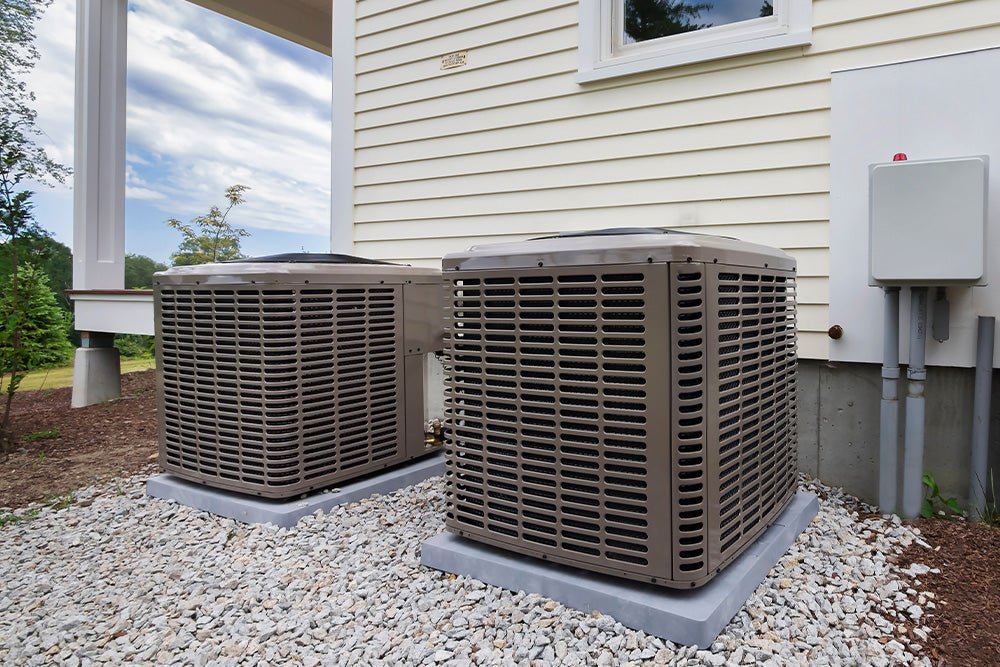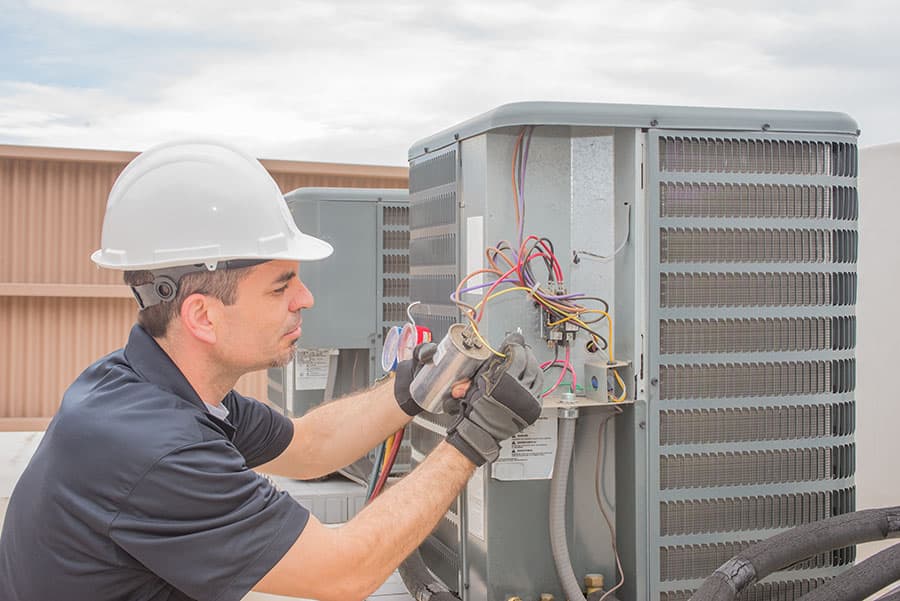Understand how HVAC experts provide on-demand support as required
Discovering the Important Components of an Efficient Heating And Cooling System
An effective HVAC system is built on a number of vital parts that operate in consistency. Each component, from the thermostat to the ductwork, plays a necessary function in preserving convenience and energy performance. Comprehending these elements is vital for maximizing performance and enhancing indoor air quality. As one examines these parts, the elaborate partnerships between them reveal insights into enhancing general system effectiveness. What particular aspects contribute most to this efficiency?
The Duty of the Thermostat in Heating And Cooling Effectiveness

Usually overlooked, the thermostat plays a crucial role in the efficiency of Heating and cooling systems. This small tool serves as the primary nerve center, controling temperature level setups and making sure optimal comfort within an area. By accurately sensing the ambient temperature level, the thermostat connects with the ventilation, home heating, and air conditioning units to keep the wanted environment
An efficient thermostat decreases power intake by triggering the cooling and heating system only when needed, consequently avoiding extreme home heating or air conditioning. Modern programmable and wise thermostats enhance this effectiveness even more by permitting users to set timetables and from another location change setups, adjusting to everyday routines.
Moreover, the positioning of the thermostat is important; incorrect place can lead to incorrect temperature analyses, leading to inefficient operation. Overall, a well-functioning thermostat not only boosts convenience yet additionally contributes considerably to energy savings and the long life of the cooling and heating system.
Recognizing the Value of Air Filters
Air filters offer a necessary feature in HVAC systems by ensuring that the air distributing within an area remains tidy and healthy and balanced. These filters catch dirt, allergens, and other pollutants, avoiding them from being recirculated throughout the setting. By catching these bits, air filters contribute to enhanced indoor air high quality, which can significantly benefit occupants' wellness, specifically those with allergies or respiratory conditions.
In addition, maintaining clean air filters boosts the performance of a/c systems. Stopped up filters can limit air flow, triggering the system to work more difficult to maintain preferred temperatures, resulting in raised power usage and higher utility costs. Routinely replacing or cleaning up filters is a crucial upkeep action that can prolong the lifespan of cooling and heating devices. Eventually, understanding the importance of air filters permits property owners and building managers to take positive measures to ensure a well-functioning, effective HVAC system that advertises a secure and comfortable interior environment.

The Functionality of the Heater and Warm Pump
Furnaces and warmth pumps are essential elements of HVAC systems, accountable for providing heat during chillier months. Furnaces operate by heating air with burning or electrical resistance, after that distributing it throughout the home using air ducts. They typically offer rapid home heating and can be fueled by gas, electricity, or oil, depending on the system kind.
Conversely, heatpump transfer heat instead than create it. They remove warm from the outside air or ground, also in low temperatures, and move it indoors. HVAC experts. This dual capability enables warmth pumps to likewise give air conditioning in warmer months, making them flexible options for year-round climate control
Both systems call for correct maintenance to ensure performance and longevity. While heaters master extreme chilly, heatpump can be beneficial in moderate environments. Understanding their unique capabilities help property owners in picking one of the most ideal alternative for their heating requires.
Exploring the A/c Unit
The cooling unit is an essential component of HVAC systems, available in different types to suit various requirements. Comprehending the efficiency scores of these systems is vital for making notified selections concerning energy usage and price. This section will certainly explore the varied kinds of a/c and clear up exactly how efficiency ratings impact performance.
Kinds Of Air Conditioners
While different factors influence the option of cooling systems, recognizing the different kinds readily available is important for house owners and building managers alike. Central air conditioning conditioners are developed to cool whole homes or buildings, making use of a network of air ducts for air flow. Window units supply an even more local service, ideal for small rooms or solitary spaces. Portable ac system provide adaptability, enabling customers to move the device as required. Ductless mini-split systems are another alternative, combining the performance of main systems with the comfort of zoning, as they require no ductwork. Geothermal systems harness the earth's temperature level for energy-efficient cooling. Each kind features distinctive advantages, making notified selections important for effective climate control.

Effectiveness Scores Discussed
Understanding efficiency scores is important for selecting the ideal a/c unit, click here as these metrics supply insight into the system's performance and power consumption. One of the most usual ranking for air conditioning unit is the Seasonal Power Effectiveness Proportion (SEER), which gauges the cooling outcome during a normal cooling season split by the total electric power input. A higher SEER shows much better performance. Furthermore, the Power Effectiveness Ratio (EER) is made use of for measuring effectiveness under specific problems. Another vital metric is the Energy Star certification, which symbolizes that an unit fulfills rigorous energy performance guidelines. By assessing these rankings, customers can make informed options that not just optimize comfort however also reduce power costs and environmental impact.
The Value of Ductwork and Air movement
Efficient ductwork layout and airflow administration play crucial roles in the total efficiency and performance of cooling and heating systems. Appropriate ductwork guarantees that conditioned air is distributed uniformly throughout an area, lessening temperature changes and boosting convenience. Properly designed air ducts decrease resistance to airflow, decreasing the workload on HVAC tools and inevitably lowering energy consumption.
Airflow administration entails purposefully positioning vents and signs up to improve the circulation of air. This prevents usual concerns such as warm or chilly places, which can happen when air movement is blocked or improperly balanced. In addition, the ideal air duct materials and insulation can further improve efficiency by lowering warmth loss or gain during air transit.
An efficient ductwork system not just adds to power savings but can also lengthen the life-span of cooling and heating equipment by decreasing unneeded stress (HVAC experts). As a result, comprehending the significance of ductwork and air movement is essential for achieving peak a/c system performance
Routine Upkeep Practices to Improve Performance
Normal upkeep techniques are necessary for guaranteeing peak performance of HVAC systems. These techniques include regular evaluations, cleaning, and essential repair work to maintain the system running effectively. Routinely changing air filters is vital, as clogged filters can block air movement and lower effectiveness. Additionally, professionals need to check and clean evaporator and condenser coils to avoid overheating and energy wastefulness.
Yearly professional examinations are also suggested, as trained technicians can determine possible issues before they rise. Lubing relocating components decreases damage, adding to a much longer life-span for the system. Ensuring that the thermostat works appropriately aids in keeping ideal temperature control.
Regularly Asked Questions
Just how Commonly Should I Change My Thermostat?
Thermostats should usually be changed every 5 to 10 years, relying on usage and innovation advancements. Regular checks are recommended to assure peak performance, especially if experiencing inconsistent temperature control or increased energy prices.
What Dimension Air Filter Is Ideal for My Heating And Cooling System?
The very best dimension air filter for a cooling and heating system varies by unit design. Commonly, it's vital to speak with the owner's handbook or examine the existing filter dimensions to ensure peak efficiency and air high quality.
Can I Install a Heatpump Myself?
Mounting a warm pump individually is possible for proficient people, however it calls for expertise of regional codes and electric systems. Hiring a specialist is suggested to guarantee appropriate setup and optimal system performance.
Just how Do I Know if My Ductwork Is Efficient?
To figure out ductwork efficiency, one must look for leakages, measure air movement at vents, check insulation quality, and examine temperature differences in between supply and return air ducts. Professional analyses can supply detailed insights into total efficiency.
What Are Indications My A/c Requirements Immediate Maintenance?
Indicators that a cooling and heating system requires immediate upkeep include unusual noises, irregular temperatures, raised energy bills, undesirable odors, and regular biking. Dealing with these concerns without delay can avoid additional damages and assurance peak system performance.
Air filters serve a crucial function in Heating and cooling systems by guaranteeing that the air flowing within an area stays tidy and healthy. Furthermore, keeping clean air filters boosts the effectiveness of Heating and cooling systems. Ductless mini-split systems are one more choice, incorporating the efficiency of central systems with the ease of zoning, as they need no ductwork. Understanding effectiveness rankings is essential for choosing the ideal air conditioning device, as these metrics give understanding right into the system's efficiency and energy intake. The ideal size air filter for a Cooling and heating system differs by unit style.